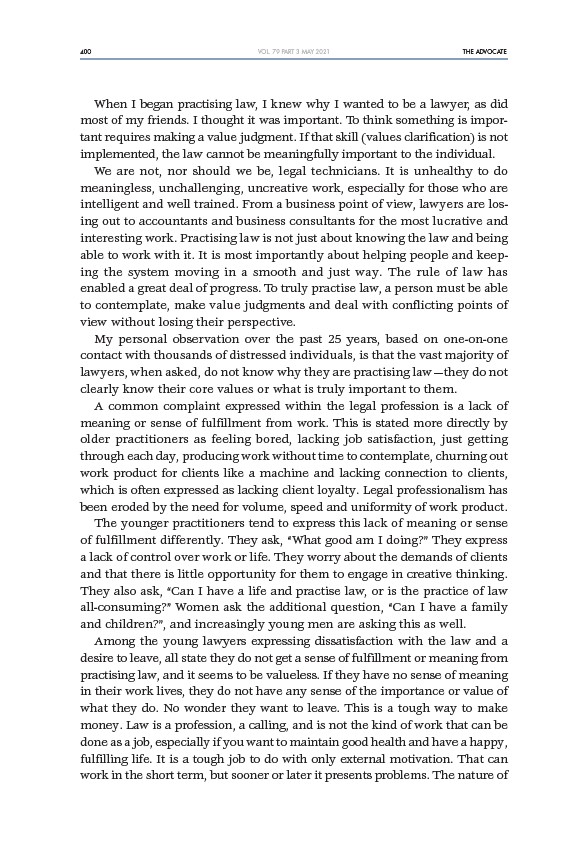
400 THE ADVOCATE
VOL. 79 PART 3 MAY 2021
When I began practising law, I knew why I wanted to be a lawyer, as did
most of my friends. I thought it was important. To think something is important
requires making a value judgment. If that skill (values clarification) is not
implemented, the law cannot be meaningfully important to the individual.
We are not, nor should we be, legal technicians. It is unhealthy to do
meaningless, unchallenging, uncreative work, especially for those who are
intelligent and well trained. From a business point of view, lawyers are losing
out to accountants and business consultants for the most lucrative and
interesting work. Practising law is not just about knowing the law and being
able to work with it. It is most importantly about helping people and keeping
the system moving in a smooth and just way. The rule of law has
enabled a great deal of progress. To truly practise law, a person must be able
to contemplate, make value judgments and deal with conflicting points of
view without losing their perspective.
My personal observation over the past 25 years, based on one-on-one
contact with thousands of distressed individuals, is that the vast majority of
lawyers, when asked, do not know why they are practising law—they do not
clearly know their core values or what is truly important to them.
A common complaint expressed within the legal profession is a lack of
meaning or sense of fulfillment from work. This is stated more directly by
older practitioners as feeling bored, lacking job satisfaction, just getting
through each day, producing work without time to contemplate, churning out
work product for clients like a machine and lacking connection to clients,
which is often expressed as lacking client loyalty. Legal professionalism has
been eroded by the need for volume, speed and uniformity of work product.
The younger practitioners tend to express this lack of meaning or sense
of fulfillment differently. They ask, “What good am I doing?” They express
a lack of control over work or life. They worry about the demands of clients
and that there is little opportunity for them to engage in creative thinking.
They also ask, “Can I have a life and practise law, or is the practice of law
all-consuming?” Women ask the additional question, “Can I have a family
and children?”, and increasingly young men are asking this as well.
Among the young lawyers expressing dissatisfaction with the law and a
desire to leave, all state they do not get a sense of fulfillment or meaning from
practising law, and it seems to be valueless. If they have no sense of meaning
in their work lives, they do not have any sense of the importance or value of
what they do. No wonder they want to leave. This is a tough way to make
money. Law is a profession, a calling, and is not the kind of work that can be
done as a job, especially if you want to maintain good health and have a happy,
fulfilling life. It is a tough job to do with only external motivation. That can
work in the short term, but sooner or later it presents problems. The nature of